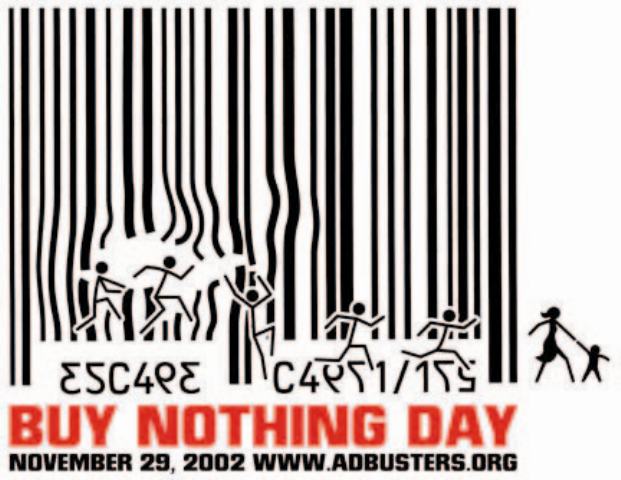
 |
| www.adbusters.org |
Considering
Consumption
Donna Tarbania
Progressives have long understood that our personal choices, whether and how we consume, affect not only our households, but also our communities and the wider world. For decades now, we have paid attention to the far-reaching impacts of our capitalist/consumer system on ecosystems and human societies. Guided by political, spiritual and/or moral values, we have made considered, conscious choices about a whole host of things. Progressives have started credit unions and food co-ops, buy from locally-owned stores and direct from farmers, shop at thrift stores or have clothing swaps and recycle religiously. They lobby for bike lanes and public transportation, buy mileage-thrifty used cars, look for union labels, wear organic cotton. We shun plastic, buy compact fluorescents, grow our own veggies, carry cloth bags and many of us are even familiar with the Church of Stop Shopping and celebrate Buy Nothing Day (November 28 this year).
Certainly the influence of any one of us is small. But whether we conserve or waste, it is real. And many people affect things in a big way. Here are a few things to consider:
•25 years ago,
fair trade was a modest concept familiar mainly to faith-based activists working
to raise living standards in scattered communities in the global South. Today,
over 7.5 million disadvantaged producers and their families benefit from fair
trade funded infrastructure, technical assistance and community development
projects, and fair trade products generally account for 1-20% of all sales in
their product categories (most notably handicrafts, coffee, cocoa, sugar, tea,
bananas, honey, cotton) in Europe and North America.
• The number of farmers markets
in the United States continues to grow, reaching a total of 4,685 in August
2008, a 6.8 percent increase since 2006.
•US acreage planted to organic
cotton in 2006 increased 14 percent from the previous year, and while certified
organic cotton currently represents only an estimated .1% of the cotton grown
in the world, close to 20% uses lower chemical input practices (IP/CM - Integrated
Pest/Crop Management).
Beyond
the numbers: building community
If this seems like a drop in the bucket of the global economy (and it is), it
is nonetheless real progress that can be built on.
In my experience, the changes wrought on a personal level are profoundly transforming. Activist Marisa Handler wrote that "every action taken in the name of our interconnection…brings us closer to ourselves, to each other, to the planet - and births a better world." This to me feels true. One decision along the path to voluntary simplicity has led to others. As I have found other people making the same choices, and spoken to friends about my experiences, I have gradually become part of a dispersed yet unified community rejecting complacency, passivity, victimhood, unconsidered consumerism and waste. This has not felt like sacrifice, though it is sometimes difficult to communicate that fact to folks more absorbed in the larger culture. And I think it is just this sense of community, of common purpose if you will, that is among our strongest selling points in inspiring others to make similar changes in their lives.
Certainly, it will take more than information - it can be disempowering to acknowledge the powerful forces advocating consumption and the complex and difficult problems we face. Urgency can easily morph into something like desperation. After all, if a little considered consumerism is good, a lot must be better, right? If it works for you, it surely works for everyone.
I am not so sure. Righteousness wears many masks, and a guilt-ridden ethic spreading the joys of doing without is a hard sell serving no one. Among family and friends it can be a fine line to tread. I have on more than one occasion felt myself to be a ghost at the feast, an unwelcome fount of unsolicited suggestions and too much information on "the real story" behind someone else's pleasure. On the other hand, it is important to resist the co-optation of the moment, when virtually every gadget or status item can apparently be rationalized as somehow "green".
Enjoying life's pleasures
while avoiding excess
Somewhere between these two is a small scale alternative to a high-consumption
lifestyle, a path that can truly revitalize household and community economics.
I believe it involves giving ourselves and others permission to enjoy some of
life's great pleasures - giving or receiving a thoughtful gift, delicious food,
a beautifully-made or stylish article of clothing. It involves asking the questions:
how much is enough? when does consumption no longer add appreciably to human
satisfaction? what level of consumption can the earth support?
"Accepting and living by sufficiency rather than excess," as Alan Durning writes, "offers a return to what is, culturally speaking, the human home: the ancient order of family, community, good work and good life; to a reverence for excellence of craftsmanship; to a true materialism that does not just care about things but cares for them; to communities worth spending a lifetime in."
With this vision in mind, please consider the opportunities presented by the Plowshares Craftsfair. Bring friends and neighbors who have never been, come for the day, have a meal, talk to someone you don't know. Consume less, but consume locally and wisely.
For more on the Church of Stop Shopping, visit www.revbilly.com;
for Buy Nothing Day, see www.adbusters.org.
For a funny, insightful, fast-paced and fact-filled animated short that looks
at the underside of our production and consumption patterns go to www.storyofstuff.com.